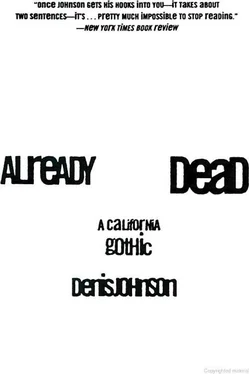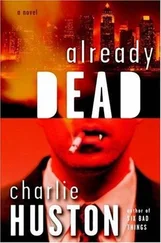He parked the car off the Coast Highway and went quietly in the blackness of his uniform along dwarf forestation to the bluff. Dogs’
voices whipped away on the gusts: this was private property. He was dizzy; his bloodstream seemed to flutter. The moon was invisible, but it was around here somewhere, light from the clouds showed him his hands in front of his face. He rested at this shifting height above the imploding surf, then descended, almost squatting, the seat of his slacks dragging over the knobs of bared roots and stones, his arms out either way, catching at others, until the earth leveled and he felt the shore like muscle under his tread and heard the water licking and breathing.
He’d climbed down to the north end of a small, almost beachless 386 / Denis Johnson
cove. On the bluff above the southern end was her house. He didn’t know why he couldn’t just walk down her drive and knock. He listened for his explanation and heard nothing. Stood there ashamed and beautiful. Offshore the ocean appeared to pulverize itself against the great rocks, but he understood this to be completely illusory; the rocks were the ones disintegrating. Right now, she felt him. This was the place for them. She would come. Right now, she was watching.
Crazy. But the way, afterward, she’d wept in terror. To see her busted like that. Even if it wasn’t himself who broke her down.
He made his way in the darkness along the waterline until he found the path up to her and climbed it fast, not pausing until he could make out, from some ways below, the house jutting over the bluff and the big glass doors onto its balcony reflecting the night-clouds offshore.
She might let him back in one more time. She wouldn’t let him come again after that. She’d call the cops on him. Merton would have to drag him out of here.
The back rooms of the house were unlit. He walked around front and it was the same. The house was thick with a special darkness. She waited inside it…He stood still, not making a sound, surely less than twenty feet from her door.
He’d be arrested if he insisted on coming around — he understood his worth to her, he knew it wasn’t anything, he realized he’d spent it.
But perhaps this one time more. He stood paralyzed in the gantlet of small tormented trees, and how many had once been lonely men, how many of them had been her lovers? And now he was in motion toward her door. He didn’t know what he would find. He didn’t know what he would do. But he knew what he would find. He knew what he would do.
Four days before Clarence Meadows shot them both dead, as they headed north on Route 101 to reenter the logging industry and sleep once again in sheets, Falls spat out at the rushing world and told Thompson—
“You’re doing it. You’re doing it. You’re doing it right now.”
“Wonderful,” Thompson said. “Everything I say.”
“I admit it’s not even a conscious thing,” Falls said.
“Then I don’t talk? I stay totally mute?”
“Would you put your shirt back on, please?”
“You’re just bummed.”
Falls is silent. Ruminating on a seed of hate.
“So we saw the world,” Thompson said, “and at least broke even.”
“We lost old Sarah.”
“That’s Busk’s loss, not mine.”
“She was a good dog. He’ll want restitution.”
“My credit’s good with Busk. How old is that dude? He must be in his eighties. And he still practices every habit that’s supposed to cut you down.”
“Hey,” Falls said. “Look at that.”
“Pull in! Well. It just could be.”
388
In order to negotiate the exit, Falls had to stop on the interstate and back up along the shoulder slowly, staring at the extended side-view mirror. “Very few little ragtop hummers like that around, man.”
“I believe we’re under a sign,” Thompson announced.
They made slowly toward the Porsche.
“All of a sudden I like it. This is fun.”
“It is. It’s like we’re detectives.”
“Hunters, but on a new level, a higher level.” They’d run across Fairchild in Point Arena nearly a week ago, and at first sight of them the grower had bolted north, along the coast.
Somewhere before the town of Mendocino, they’d lost him.
They’d doubled back and tried the road up to the Albion Ridge, but it was just an empty upward quietness in which the motor started overheating while their energies drained away. “Great view,” Thompson said when he’d turned the Silverado around and they sat looking at the Pacific in the light of a cloud-eaten moon…They’d returned to Gualala, hung around town till Tuesday, just in case; in case nothing. Lally had paid them two hundred each and begrudged them something extra for gas and had dismissed them — with his eyes, with his shoulders, with his little drink, he’d dismissed them.
This morning they’d broken camp and slunk away before daylight, deferring payment of the fee. And now, parked all by itself at a rest stop one hundred miles north, here’s the Porsche convertible.
At the cool, still general store in Whiskeytown, Fairchild bought a packet of a hundred typesheets, two ballpens and a fountain pen and many liters of wine. They had shelves of California vineyard labels but not one large-size envelope. In the car he found an old one, creased but not torn, from the tax harpies in Sacra-mento, an envelope once the vessel of extensive really penetrating — burrowing — irritations, but he felt nostalgic for regular civic troubles now.
Though in love with the name of this town, he pressed on for greater altitudes. For Weaverville.
“ Dear Win and Van ”—Win and Van, he thought, how cute — and wrote that thought down too and, still standing, wrote for several minutes more before uncorking the wine and sitting down at the desk by the window of a room in the Trinity Alpine Lodge: above Already Dead / 389
a pond sprinkled with leaves and twigs like fingernails and bones, a low-rent swannery where waterfowl drew arrow-feathers in the surface.
At so high an elevation, snow would soon be descending on these ducks.
He didn’t know what would become of them then.
After he’d half-filled a second page he got up, went into the bathroom, and turned on the shower. He sat down again at the desk and dangled one hand toward his shoes to unwork the laces, his eyes on the words he’d written, and started adding to these words, forgetting his feet, and wrote until the sound of water invaded his focus he didn’t know how much later. He got up and turned the shower off.
He ate supper the first night at a cafe down the street, but thereafter took no more food, and spent the following four days writing, napping occasionally, wandering sometimes — finding himself sometimes inexplicably, without any recollection of having moved — downstairs, where Ames, the proprietor, this cockeyed bastard, Fairchild had forgotten he was cockeyed, kept abreast of things on an astonishingly tiny Sony TV
despite his left eye’s divigations, in a parlor of hand-peeled pine — the furniture, the wall logs stippled with brown cambium and wavering in Fairchild’s sight, as upstairs too, in the room, where a single big rainbow trout floated on a plaque above the bed and a yellow-toothed agate-eyed black bear struggled across the floor.
The fourth, the fifth — which? — dawn found him still piling his thoughts onto pages, disembarrassing himself of certain burdens, clearing his brain and vision of the rubble of all this mania he’d brought down, interrupted only once by Ames as he made the rounds with kindling for the rooms. It reached the eighties in the daytime, and Fairchild hadn’t used any kindling. Ames refused to greet him. The wheezy old moron. He disliked Fairchild because Fairchild suggested that by the look of the pelt maybe his bear rug had been hunted down with ack-ack…Fairchild wrote this description down, sorry to have offended the old character — but this was his special talent — with a single anemic
Читать дальше












